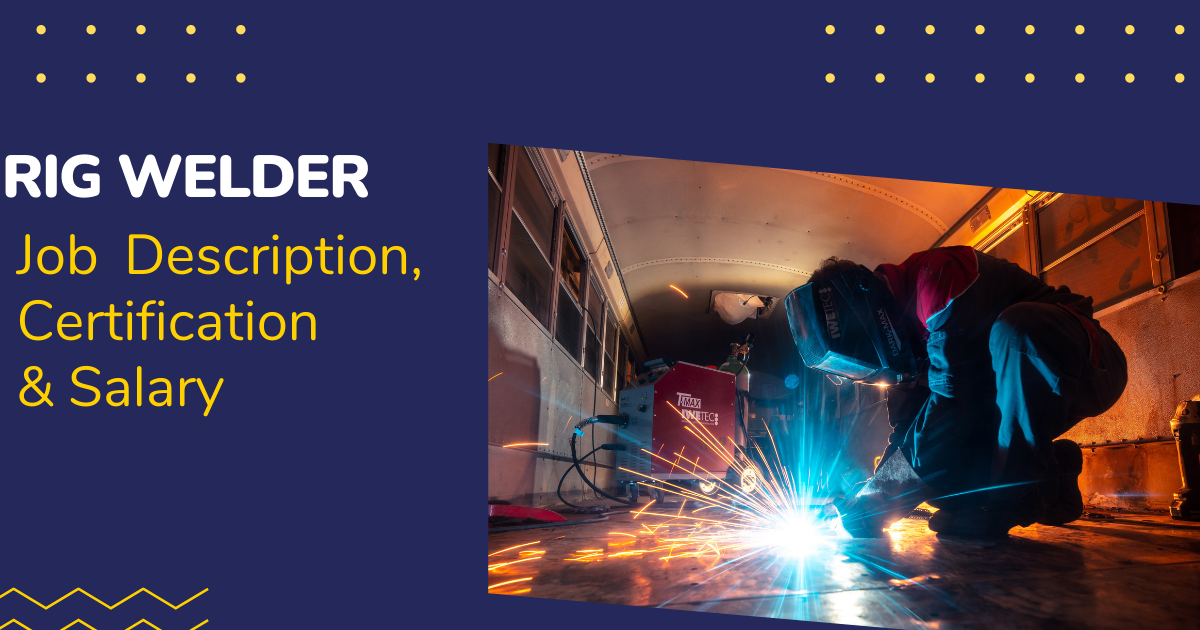
Rig Welder Job Description And Salary
By Tomiwa Oladipo Published January 2023
Who Is a Rig Welder?
A Rig Welder is in charge of assembling and welding metal plates and other metal structures that make up the drilling platform and rigs. They ensure the metal infrastructures used to extract, process, and store oil are strong enough to withstand heavy-duty work.
What Does a Rig Welder Do?
A Rig welder is responsible for a wide range of specialized tasks, which include:
- Reading and interpreting technical drawings and blueprints of industrial equipment to assemble them accordingly.
- Welding the mast, derrick, and other support infrastructures
- Welding metal pipes, plates, and other materials to build new metal structures like storage tanks.
- Inspecting welds to ensure they are strong, durable, and according to specification.
- Assembling and repairing pipelines for oil and natural gas companies.
- Welding large structures like boilers, oil platforms, and ships
- Maintenance and proper storage of welding equipment
- Test and inspect the vessel and/or piping systems for leaks or defects.
- Installation, repair, troubleshooting, and replacement of broken valves, joints, or pipes, using power and hand tools, gas torches, and welding equipment.
- Perform welding duties using wire welding GMAW (Gas Metal Arc Welding), or SMAW (Stick Welding).
- LDAR repair and compliance assurance
- Operate computerized welding tools, including plasma cutters and arc welders.
- Study blueprints, sketches, or specifications, calculate dimensions
- Handle other duties like tidying work sites and keeping shop records, as specified by the supervisor.
Other Job Skills and Requirements
- Ability to work in confined spaces.
- Ability to endure noisy environments due to frequent use of power equipment and tools
- Ability to endure intense weather and other harsh conditions
- Physical strength, stamina, and mental alertness
- Lifting and rigging experience.
- Attention to detail
- Good communication skills
- Math skills
- Knowledge of welding safety standards.
- Knowledge and execution of various welding techniques
- Knowledgeable in metallurgy principles to (choose appropriate material and welding process for every job)
- Strong problem-solving skills to resolve an issue that arises while welding
- Installing, maintaining, and repairing oil drill machinery
- Proficiency in operating welding equipment and tools
- Ability to swim
- Ability to follow verbal and written instructions
- Ability to use hand tools and power tools
- Ability to store, transport, handle and use oxygen, acetylene, and propane.
What Skills and Education do you need to become a Rig Welder?
The easiest way to be a rig welder is to go through a three-year apprenticeship program; however, a rig welder needs the following qualification:
Education
The minimum qualification to be a rig welder is a high school diploma or GED. However, some employers accept a postsecondary certificate or an associate's degree in any welding-related field.
Technical Training
Upon finishing high school, it is essential to go through a two-year technical training program to practice as a rig welder.
Training and Experience
Several rig welder employers provide on-the-job training for recruits. They learn the basics of the job, safety procedures, how to use welding equipment, and different welding techniques.
It is best practice to gain experience before being employed. You can gain relevant experience through volunteer work.
Certification and Licenses
Obtaining a welding certificate proves you're professionally competent to practice as a rig welder. You can obtain relevant certifications via an online platform or a community college. The common certifications include:
- SMAW
- GTAW
- FCAW
Also, you must register for the TWIC card to work as an offshore oil rig welder in the US.
Welder Performance Qualifications
Welding is a skill that requires continual practice. It’s possible to lose the particular skills tested in a welder qualification if the welder does not perform similar welding for an extended period.
Therefore, welders must revalidate their Welder Performance Qualifications regularly to show they still have the required welding skills.
Welding Codes
Welding codes establish the basis for performing welder qualification or coding tests. The welding codes for the oil and gas industry include:
- ASME VIII (Pressure vessels)
- ASME B31.3 (Process plant piping)
- ASME B31.8 (Gas transmission piping)
- API 6D (Valves)
- API 6A (Well-head equipment)
- API 650 (Tanks for oil storage)
- ASME B31.4 (Pipelines for liquids and slurries)
- ISO 10423 (Wellhead equipment)
- ISO 13628-4 (Subsea wellhead equipment).
- API RP 2A (Offshore platforms)
- EEMUA 158 (Offshore structures in the North Sea), etc.
FAQs
What’s a rig welder’s salary?
The average salary of a rig welder in the U.S. is $77,000 per year. The pay may vary based on experience, education, location, and company.
Who does a rig welder report to?
The welding supervisor
How long does it take to become a rig welder?
Depending on the mode of training, it takes between seven months to two years of practical experience to become a rig welder.
How do I get certified as a rig welder?
In the United States, you can obtain national rig welding certifications through the American Welding Society (AWS). You can get them either independently or through other welding programs accredited by AWS. Also, some employers provide internal certification examinations.
Can rig welders advance their careers?
Yes. With relevant years of experience, rig welders can advance their careers by obtaining more certifications. A rig welder can advance to be a welding supervisor or inspector.
Rig Welder Jobs Near Me
For more information on becoming or finding rig welder jobs, please don't hesitate to contact our support team. We're happy to chat with you about how our global energy talent marketplace can help connect you with oil and gas companies hiring for several rig-based positions.
You should also register here to access ongoing projects needing your skillset.